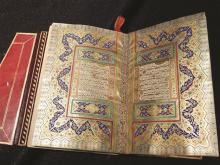Sultan Abdulaziz
Beykoz Glass Museum awaits visitors
The Beykoz Glass and Crystal Museum, which opened on April 9 with an official ceremony attended by President Recep Tayyip Erdoğan after restoration works, is now awaiting visitors.
- Read more about Beykoz Glass Museum awaits visitors
- Log in to post comments
Ottoman heritage in South Africa lives on with marching band
A marching band, known as the "Ottoman Marching Band," is keeping the Ottoman cultural and historical heritage alive in Africa.
The band, founded by Malaysian immigrants in 1949, is made up of mostly Muslim South Africans and attracts attention with the red fezzes used by the members during their performances.
Centuries-old encrypted letter stirs up mystery at harem of Topkapı Palace
Ongoing restorations at Topkapı Palace have unearthed never-before-seen silver and gold coins, jewelries, talismans, amulets and letters. But one mysterious finding amongst others was an encrypted letter dating back to 1871, carrying the seal of Cevher Agha, also known as the Dârüssaade Ağası, the chief eunuch of Sultan Abdülaziz’s harem, found in a closet at the harem of the palace.
Music student buys Ottoman kemancha
A stringed instrument that once belonged to a woman in the harem of Sultan Abdulaziz has been bought by a 22-year-old Turkish music student.
Emine Bostancı, who studies at Rotterdam Conservatory in the Netherlands, bought the three-stringed kemancha from a Canada-based collector for around 20,000 Turkish liras ($5,670).
- Read more about Music student buys Ottoman kemancha
- Log in to post comments
Ottoman sultan's paintings in Paris
Paintings of Ottoman Sultan Abdulaziz will be showcased at an exhibition in Paris between April 26 and May 7, the International Culture and Arts Association (UKSD), the exhibition's organizer, said in a statement April 20.
- Read more about Ottoman sultan's paintings in Paris
- Log in to post comments
Non-Ottoman and non-Turkish gaudiness
When I saw the gaudy chairs German Chancellor Angela Merkel was seated in during her visit to Turkey, I took a look at the photos of Sultan Abdülaziz and Sultan Abdul Hamid; no, they did not have such gaudy armchairs.
It is not tasteful splendor, it is only gaudiness. The correct word for these armchairs and for the presidential palace in Ankara is "gaudy."
- Read more about Non-Ottoman and non-Turkish gaudiness
- Log in to post comments
Quran manuscript sold by Christie's
A Quran manuscript, written by Mahmut Celaleddin in the second half of the 18th century and owned by Sultan Abdulaziz, was sold for 540,000 pounds at the Islamic artworks auction, which was held on Oct. 8 in London by Christie?s.
- Read more about Quran manuscript sold by Christie's
- Log in to post comments





